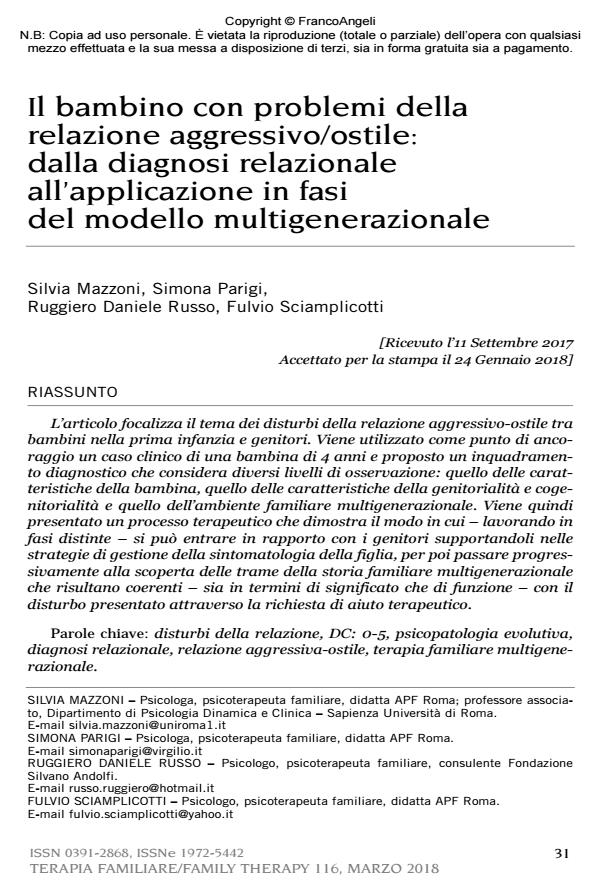The child with aggressively hostile relationship: from the relational diagnosis to the multigenerational model stages implementation
Journal title TERAPIA FAMILIARE
Author/s Silvia Mazzoni, Simona Parigi, Ruggiero Daniele Russo, Fulvio Sciamplicotti
Publishing Year 2018 Issue 2018/116 Language Italian
Pages 21 P. 31-51 File size 138 KB
DOI 10.3280/TF2018-001003
DOI is like a bar code for intellectual property: to have more infomation
click here
Below, you can see the article first page
If you want to buy this article in PDF format, you can do it, following the instructions to buy download credits

FrancoAngeli is member of Publishers International Linking Association, Inc (PILA), a not-for-profit association which run the CrossRef service enabling links to and from online scholarly content.
The article focuses on the problem of aggressive-hostile relationships between children and parents in early childhood. A clinical case of a 4-yearold girl is used as an anchor point and proposes a diagnostic framework that considers different levels of observation: that of the characteristics of the child, that of the characteristics of parenting and coparenting and that of the multigeneration family environment. A therapeutic process is then presented demonstrating how - by working in distinct phases - it’s possible to interact with parents by supporting them in the strategies of managing the symptomatology of the child, and then gradually progressing to the discovery of multigenerational family stories that result coherent - both in terms of meaning and function - with the disorder presented through the request for therapeutic aid.
Keywords: Relational disturbances, DC: 0-5, developmental psychopathology, relational diagnosis, aggressive-hostile relation, multigenerational family therapy.
- Andolfi M. (1977). La terapia con la famiglia. Roma: Astrolabio.
- Achenbach T.M., Ruffle T.M. (2000). The Child Behavior Checklist and related Forms for assessing Behavioral/Emotional Problems and Competencies. Pediatric in Review, 21 (1): 265-271.
- Ackerman N.W. (1958). The Psychodynamics of Family Life. New York: Basic Books (trad. it.: Psicodinamica della vita familiare. Torino: Bollati Boringhieri, 1999).
- Andolfi M. (1995). Il bambino come consulente. In: Andolfi M., Haber R. (a cura di), La consulenza in Terapia Familiare. Milano: Raffaello Cortina.
- Andolfi M. (2010). Il bambino in terapia familiare. Milano: FrancoAngeli.
- Andolfi M., Falcucci M., Mascellani A., Santona A., Sciamplicotti F. (a cura di) (2007). Il bambino come risorsa nella terapia familiare. I seminari di Maurizio Andolfi. Roma: APF.
- APA (2014). Manuale Diagnostico e Statistico dei Disturbi Mentali DSM-5. Milano: Raffaello Cortina.
- Cirillo S., Selvini M., Sorrentino A.M. (2016). Entrare in terapia. Le sette porte della terapia sistemica. Milano: Raffaello Cortina.
- Cummings E.M., Davies P.T., Campbell S.B. (2000). Developmental Psuchopathology and Family Process. Theory, research and Clinical Implications. New York: The Guilford Press.
- Davies P.T., Cicchetti D. (2004). Toward an integration of family systems and developmental psychopathology approaches. Development and Psychopathology, 16: 477-481.
- Gordon R. (2003). Il ponte: una metafora dei processi psichici. Torino: Bollati Boringhieri.
- Keeney B.P. (1982). What is an epistemology of family therapy? Family Process, 21: 153-168.
- McHale J.P. (2007). Charting the Bumpy Road of Coparenthood. Washington DC: Zero to Three (trad. it.: La sfida della cogenitorialità. Milano: Raffaello Cortina, 2010).
- Minuchin S. (1974). Families and family therapy. Cambridge (Mass.): Harvard University Press (trad. it.: Famiglie e terapia della famiglia. Roma: Astrolabio, 1981).
- Sameroff A.J., Emde R.N. (1989). Relationships Disturbances in Early Childhood. A Developmental Approach. New York: Basic Books (trad. it.: I disturbi delle relazioni nella prima infanzia. Torino: Bollati Boringhieri, 1991).
- Sameroff A.J., McDonaugh S.C., Rosenblum K.L. (eds.) (2004). Treating parentinfant relationship problems, strategies for intervention. New York: The Guilford Press (trad. it.: Il trattamento clinico della relazione genitore-bambino. Bologna, il Mulino, 2006).
- Sander L. (2006). Sistemi viventi. L’emergere della persona attraverso l’evoluzione della consapevolezza. Milano: Raffaello Cortina.
- Sorrentino A.M. (2005). Bambini e terapia familiare. Perché i bambini scompaiono dalle sedute familiari? Terapia Familiare, 77: 53-63.
- Stern D. (1987). Il mondo interpersonale del bambino. Torino: Bollati Boringhieri.
- Winnicott D.W. (1960). The theory of the parent-infant relationship. International Journal of Psychoanalysis, 41: 585-595.
- Zeanah C.H., Lieberman A. (2016). Defining relational pathology in early childhood: the diagnostic classification of mental health and developmental disorders of infancy and early childhood DC: 0-5 approach. Infant Mental Health Journal, 37 (5): 509-520.
- Zero to Three (1994). Diagnostic classification of mental health and developmental disorders of infancy and early childhood (DC: 0-3). Washington DC: Zero to Three (trad. it.: Classificazione Diagnostica: 0-3. Classificazione diagnostica della salute mentale e dei disturbi di sviluppo nell’infanzia. Milano: Masson, 1997).
- Zero to Three (2005). Diagnostic classification of mental health and developmental disorders of infancy and early childhood: revised edition (DC: 0-3R). Washington DC: Zero to Three (trad. it.: Classificazione Diagnostica: 0-3. Classificazione diagnostica della salute mentale e dei disturbi di sviluppo nell’infanzia. 1a Revisione, Roma: Fioriti, 2008).
- Zero to Three (2017). Diagnostic classification of mental health and developmental disorders of infancy and early childhood: revised edition (DC: 0-5). Washington DC: Zero to Three.
- La magie de l’enfant dans la thérapie familiale pp.231 (ISBN:9782710146360)
- L'essenziale è invisibile agli occhi: il lavoro clinico con l'età evolutiva Giulia Bettini, Fulvio Sciamplicotti, in TERAPIA FAMILIARE 133/2024 pp.45
DOI: 10.3280/TF2023-133006
Silvia Mazzoni, Simona Parigi, Ruggiero Daniele Russo, Fulvio Sciamplicotti, Il bambino con problemi della relazione aggressivo/ostile: dalla diagnosi relazionale all’applicazione in fasi del modello multigenerazionale in "TERAPIA FAMILIARE" 116/2018, pp 31-51, DOI: 10.3280/TF2018-001003